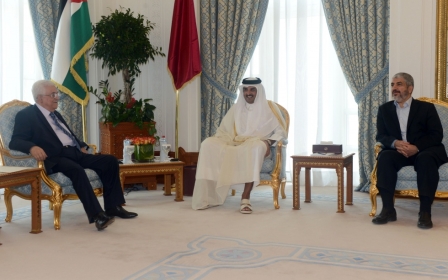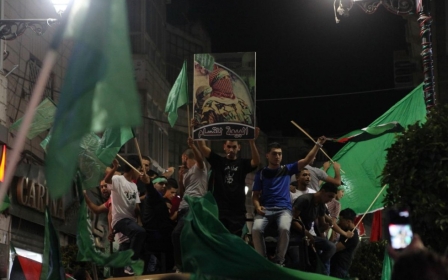Hamas: Abbas trying to 'destroy' Palestinian unity deal

Hamas on Monday accused Palestinian president Mahmud Abbas of trying to sabotage a fragile reconciliation agreement after he accused them of running "a shadow government" in Gaza.
In a sharply worded attack on Hamas, Abbas on Saturday threatened to break off the unity agreement over the group's de facto control of the Gaza Strip.
But Abbas's words sparked an angry response from Hamas, with spokesman Fawzi Barhum accusing him in turn of trying "to destroy the reconciliation and play into the hands of the Americans and the Israelis."
Fearing a coup against its democratically elected parliament, Hamas forcibly took over the Gaza Strip in 2007, ousting forces loyal to Abbas.
But the two sides signed a reconciliation deal in April, leading to the formation of a government of national consensus, which took office on June 2, following which Gaza's Hamas government formally stepped down.
The deal ended seven years of rival Palestinian administrations -- with Abbas's Fatah party which dominates the Palestinian Authority, ruling the West Bank, and Hamas's own government ruling Gaza.
The spat erupted just two weeks after the end of a major 50-day conflict between Israel and Hamas militants in Gaza.
Throughout the conflict, Hamas and Fatah put up a united front, working side-by-side to further indirect truce talks with Israel in Cairo, which resulted in an open-ended ceasefire that took effect on August 26.
"Hamas has taken us back to square one, to the days of division," a Fatah official based in Gaza told AFP, speaking on condition of anonymity.
Gaza-based political analyst Talal Awkel said: "We're now seeing a war of words and mutual accusations being exchanged between Fatah and Hamas."
The latest face-off has likely scuppered elections that were supposed to take place by the end of the year, under the terms of the April agreement.
In a statement last week, Fatah accused Hamas of placing 300 of its members in Gaza under house arrest during the seven-week conflict.
It also accused the Islamist movement of "stealing" aid bound for ordinary people in Gaza in order to "distribute it to its supporters or sell it on the black market."
Hamas dismissed the statement as a smear campaign organised by a movement whose popularity in the West Bank has slumped since the war.
Soaring popularity of Hamas
A recent opinion poll found that if a presidential election were held now, Hamas's former premier Ismail Haniya would easily win, taking 61 percent of the votes compared with 32 percent for Abbas.
During the fighting, Hamas was seen as the only Palestinian force willing to stand up to Israel, squaring up to its military might and firing rockets on Tel Aviv and Jerusalem.
Fatah, by comparison, has been increasingly associated with the West Bank forces who engage in security cooperation with Israel.
In order to redress the balance, Abbas is hoping to secure a UN Security Council resolution calling for an end to the Israeli occupation within three years.
In the likely event of a US veto, officials say Abbas will consider fast-tracking an application to become party to the International Criminal Court with a view to possible prosecution of Israel over its actions in Gaza and the West Bank.
But such a diplomatic initiative is unlikely to offset the political gains chalked up by Hamas during the war.
"After the victory in Gaza, the forces of the Palestinian Authority must change their attitude and come back into the arms of their people, instead of the arms of the occupation," Hamas said last week.
And it denounced a ban on demonstrations and a wave of arrests in the West Bank, that has seen hundreds of its members detained.
The Gaza war was a chance for Hamas to show through its military prowess that it was still relevant, Awkel said, following charges it had signed the reconciliation deal "from a position of weakness."
In the months leading up to the unity deal, Hamas was so broke that it could not even pay its own 45,000 employees.
Israel's eight-year blockade of the territory, compounded by an Egyptian lockdown on its southern border, has sparked a major economic crisis.
A dispute over who should pay Hamas employees after Haniya's government stood down in June proved to be the first crack in the unity deal.
Fights broke out at banks after the Palestinian Authority's Gaza-based staff were paid but Hamas employees were not.
Middle East Eye propose une couverture et une analyse indépendantes et incomparables du Moyen-Orient, de l’Afrique du Nord et d’autres régions du monde. Pour en savoir plus sur la reprise de ce contenu et les frais qui s’appliquent, veuillez remplir ce formulaire [en anglais]. Pour en savoir plus sur MEE, cliquez ici [en anglais].



